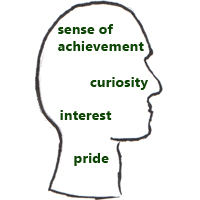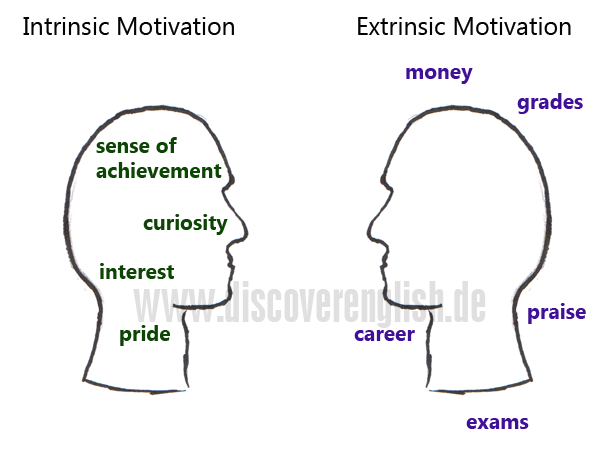 I've recently watched two interesting TEDxTalks on youtube. Two hyperpolyglots talked about learning languages. (Hyperpolyglots are people who can speak several languages). Which made me think about my own approach towards languages and learning strategies, and I realised that I use(d) mostly the same strategies. Some of them go hand in hand with each other, some of them work on their own.
I've recently watched two interesting TEDxTalks on youtube. Two hyperpolyglots talked about learning languages. (Hyperpolyglots are people who can speak several languages). Which made me think about my own approach towards languages and learning strategies, and I realised that I use(d) mostly the same strategies. Some of them go hand in hand with each other, some of them work on their own.
To be successful, the first thing to do is fall in love with your work. – Sister Mary Lauretta
Why are you learning English? What motivates you to learn English?
Do you have to pass an exam, get a good grade, or need it for your job or at uni etc.? These are all valid language learning reasons, but the motivation to learn English comes from an outside source (For example to be rewarded, or to avoid a negative outcome, like failing a test etc.)
Whilst extrinsic motivation can lead to success, it is much better to do something for its own sake (or to approach it that way) to be successful. This is called intrinsic motivation. You want to learn it, because you have the desire to become proficient in English. If you are extrinsically motivated, then the task or the exam becomes the end, instead of being a means of providing you with valuable feedback on your language learning journey. You are thus limiting your own potential!
Some examples of intrinsic and extrinsic motivation in learners. As a teenager, when I started to learn English, I didn't know anything about extrinsic or intrinsic motivation. What I did know, however, was that I wanted to live in the USA at some point in my life because I loved the English language and that's why my interest in their culture grew as well. (I ended up in the UK in the end, but that's another story ;-) )
 So from the start, I did lots of extracurricular activities like trying to read books, translating lyrics (I was a huge Bon Jovi and Gun's Roses fan back then. Don't ask :D ) and lots of talking to whomever was listening. Quite often, I bit off more than I could chew, but that only spurred me on to become even better, as there was still so much I didn't know.
So from the start, I did lots of extracurricular activities like trying to read books, translating lyrics (I was a huge Bon Jovi and Gun's Roses fan back then. Don't ask :D ) and lots of talking to whomever was listening. Quite often, I bit off more than I could chew, but that only spurred me on to become even better, as there was still so much I didn't know.
Needless to say, that I was ahead of my class quite quickly. Because I surrounded myself with English, passing exams with top grades was just one of the perks, but not my motivation. My motivation, my desire from the start was to become proficient, to at some point be able to live in an English speaking country.
If you are able to change your motivation from extrinsic to intrinsic, you will become more confident, you won't give up as easily, as your motivation comes from within. The most important strategy for learning a language (or anything really) is to change your set of motivation from extrinsic, to intrinsic!
Vocabulary (in order of appearance)
- approach: (here) the way you do things
- to go hand in hand: (here) to go together well, to be closely related
- valid: (here) good and reasonable
- means to the end: something that is done to achieve something else
- to end up somewhere: to find yourself in a place you didn't expect to be in the first place
- extracurricular: curricular activities are the subjects taught at school and the homework you have to do. Extracurricular activities are the things you do on top of that.
- to bite off more than you can chew: trying to do more than you are able to do, or is too difficult
- to spur someone on: to urge someone onward, in this case it meant that I worked even harder
- perks: rewards
Bildnachweis: Nicole Heusser
 Instagram
Instagram